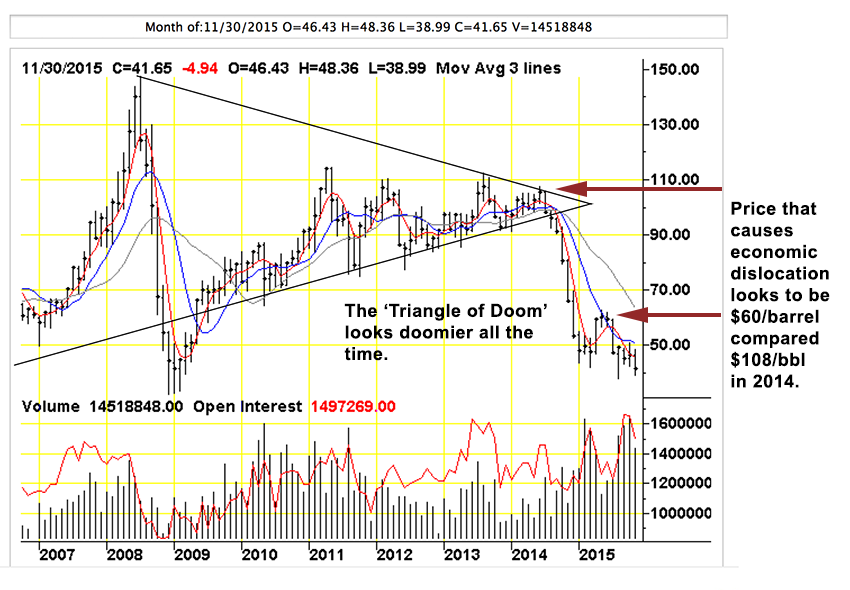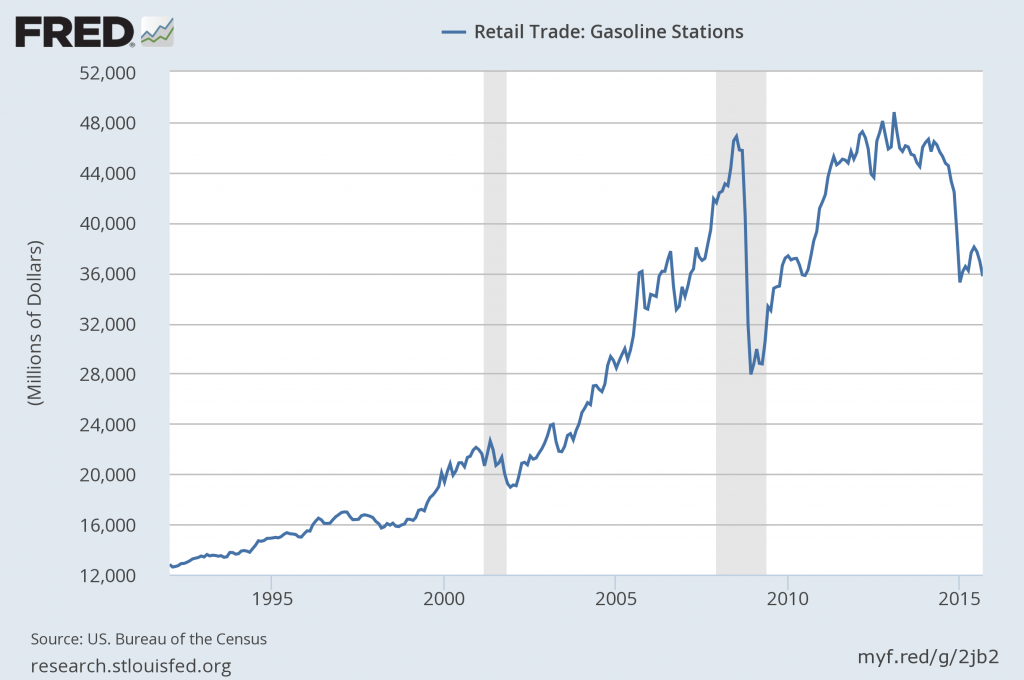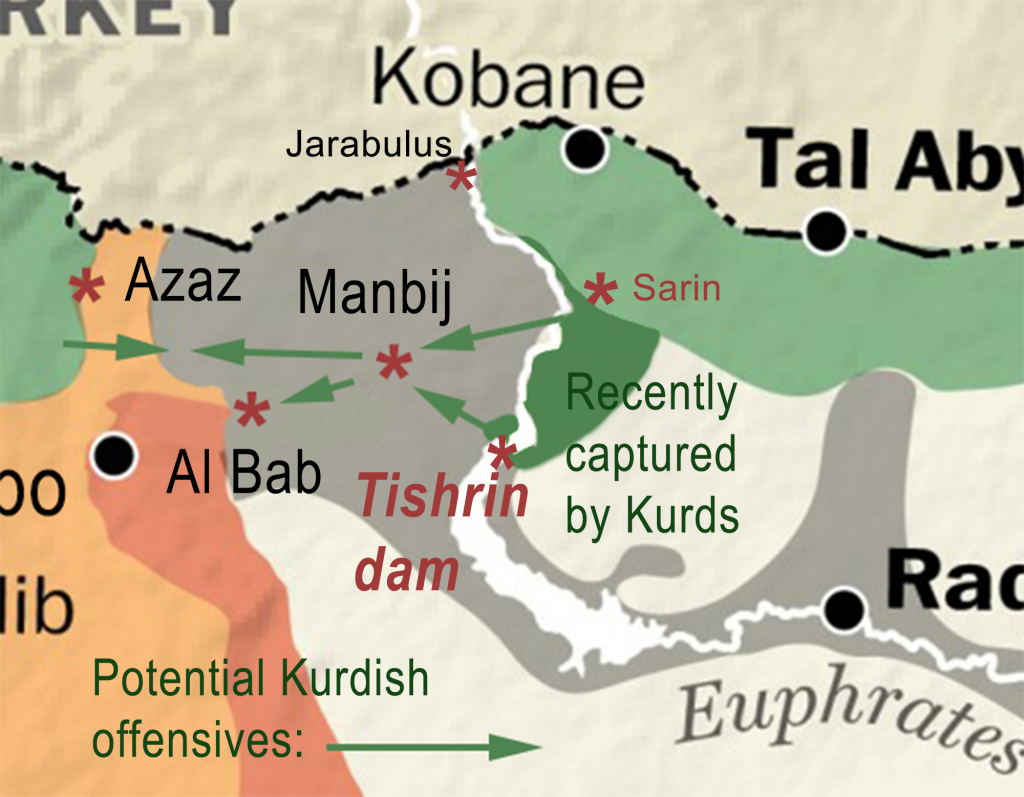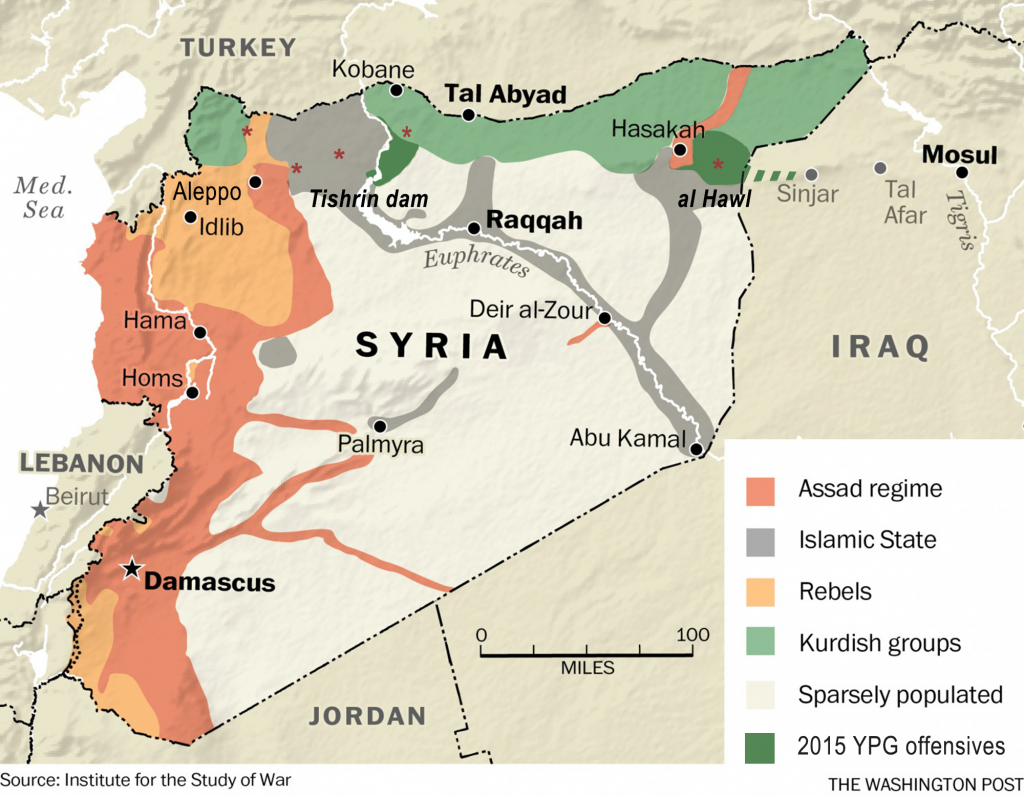

 Off the keyboard of Steve Ludlum
Off the keyboard of Steve Ludlum
Follow us on Twitter @doomstead666
Friend us on Facebook
Published on the Economic Undertow on January 4, 2016
No doubt a lot of people are happy to see 2015 in the rear view mirror: refugees, their ‘hosts’ in Europe, bond investors, frackers and Brazilians, it is likely that 2016 will bring more of the same, challenges and idiocy … and a ray of light!
— Energy deflation to take hold in 2016

Figure 1 (above): The $64 trillion dollar question: ‘Is energy deflation under way’? If it is, get ready. It will be the biggest story of 2016 and years decades to come. (TFC Charts, click for big)
Discuss this article at the Economics Table inside the Diner
Energy deflation is similar to Irving Fisher’s debt deflation: a premium or ‘scarcity rent’ is attached to the price of crude. This manifests itself as a reduction in customer borrowing power; the price of crude cannot fall fast enough to offset the ballooning scarcity rent! In energy deflation, fuel prices are always too high for customers while the same prices are too low the drillers. The outcome is a vicious cycle: increased scarcity rent and self-compounding fuel shortages => greater scarcity rent!
If oil prices happen to rise for any reason — such as a war between Saudi Arabia and Iran — the scarcity rent doesn’t go away, the entire combined price becomes even less affordable causing the price to crash again.
America’s waste-based economic infrastructure has been built assuming endless supply of sub- $20 crude into perpetuity. The inflated prices the world has endured since the turn of the millennium have left this ‘investment’ hopelessly underwater. The prices have also done a number on the credit-worthiness of ordinary customers. This is why declining prices for crude oil have so far been unable to reboot economic growth … current lower prices are still too high to offer much in the way of (debt) relief. This means more price drops to come; more driller pain.
Right now it is hard to tell whether the current ‘action’ in crude- and other markets is a trading phenomenon or something more, but we are soon to find out one way or the other. The inevitable outcome of energy deflation is the supply of fuel shrinking to the level that can be supported by productive, remunerative use … rather than the current wasteful level supported by access to credit. Because remunerative use of our fuel supply is a (very) modest fraction of overall consumption … a modest fraction of our current fuel supply is what we will be able to afford.
— Dollar Preference emerges as an economic factor in 2016
Figure 2: Hoarding much? M2 money velocity (chart by St. Louis Federal Reserve). While the actual supply of M2 funds is increasing, the volume of transaction taking place with those funds has been shrinking (plummeting).
A component of energy deflation is the effect of constrained energy supply on money. When priced in crude, money — particularly dollars — have real worth (money never has value, otherwise it would never be spent). It turns out a very modest (flow) constraint has an out-sized effect on money-worth. Right now, dollars are exchanged on demand for a valuable physical good millions of times every single at gas stations around the world. Because of this exchange, the dollar can be considered a quasi-hard currency … similar to the way exchanging dollars for gold rendered the buck a hard currency during the early 1930s. What keeps the dollar somewhat ‘soft’ despite exchangeability has been the flood of fuel into markets and gas stations. There is no obvious reason to prefer dollars or make an effort to gain them vs. something else; little in the way of ‘scarcity rent’ to distort the worth of dollars.
Given the appearance of a fuel supply constraint and the scarcity rent, the perceived character of money shifts: dollars cease to be near-worthless proxies for commerce, becoming instead proxies for scarce and valuable fuel. They are then hoarded out of circulation … as is starting to take place around the world right this minute!
Commerce withers as the economic activity is reduced to currency arbitrage; trading different forms of money back and forth so es to gain the fuel ‘bargain’ dollars represent … This is what ‘dollar preference’ means: the buck is preferred to all other kinds of money because of its relationship to fuel.
The only way to escape the depression that results from this preference is to break the bond between dollars and petroleum the same way the Roosevelt administration severed the connection between dollars and gold in 1933. The US must ‘go off oil’ the same way it- and the rest of the world went off gold in the middle-1930s.
Figure 3: Along with M2 velocity, gasoline sales have been declining. (chart by St. Louis Federal Reserve). When customer are broke — or tight-fisted — they don’t buy gas. Low prices can’t fix broke.
— The Kurds will destroy the Islamic State in Syria in early 2016.
The sharp decline in fuel prices since 2014 has severely dented the Islamic State which is not possessed of the material means of support: it has no economy to speak of, no industry, finance or organic credit. It must swap goods such as stolen fuel and antiquities with donor states by way of Turkey to gain materiel. Low oil prices means less funds to be spent on war-making, medical supplies and salaries.
Just days before Christmas, with little fuss and less warning, the Kurdish military force captured a vital road crossing over the Euphrates River, putting the Kurds astride ISIS supply lines and issuing the death-sentence for the group, (DW):
Syrian Kurds take strategic dam from ‘Islamic State’
An alliance of US-backed Syrian Kurdish and Arab rebels has taken a key dam on the Euphrates River from the so-called “Islamic State.” The alliance has pushed back “IS” from large swaths of territory.
The Syrian Democratic Forces (SDF), a rebel alliance that includes the powerful YPG Kurdish militia and Arab rebel groups, wrested control of the strategic Tishreen Dam from Islamic State on Saturday after making rapid advances south earlier this week, Kurdish media reported.
Figure 4: In war — as with finance — leverage matters: Tishrin dam on the Euphrates carries the highway from Jarabulus to Manbij- to points south and east including Raqqa and Mosul in Iraq. (Washington Post/Institute for the Study of War). Taking the dam (intact) and establishing a bridgehead on the western side of the Euphrates leaves the landlocked ISIS group at the mercy of the Kurds.
The road connection with Turkey is the only way in- or out of the Islamic State caliphate with Jarabulus-Manbij as the main thoroughfare. Leaders, recruiters, wounded fighters traveling to- and through Turkey, troop replacements from the rest of the Middle East and elsewhere, all ISIS military supplies must travel through this territory; trucks carrying purloined crude travel the other direction. As of now there is no scheduled airline service to/from anywhere in the Islamic State.
The group is responding to the existential threat by adopting a lifeboat strategy: upping efforts to organize in Libya and elsewhere in Africa. Stripped of its precious caliphate heartland and its leadership dead, captured or on the run, the group will lose relevance, becoming target practice for other ‘Brand X’ militant groups and Western commandos. In our current Islamic world without pity, every sign of weakness is an invitation to murder. At the same time, ISIS ‘threat’ will be unmasked as to a large degree a US-media creation, a fashionable ‘flavor of the month’; the ‘New al-Qaeda’ (as opposed to ‘Classic’ version), a militarily inept criminal group with violent tendencies but little else; an instrument to mold US public opinion into an appropriately warlike form.
Figure 5: Syrian zones of control along with gains by Kurdish forces since November, 2015. Islamic State supply lines extend through the area claimed by Turkey as a ‘safe zone’. The weight of strategic necessity draws the Kurds toward Manbij and al-Bab. When these towns are captured the rout will be on. The only surprise will be how quickly the IS group collapses. It will be entertaining to watch the group’s ’emirs’ on YouTube in women’s clothes filter through Kurdish territories toward Turkey in small groups … and being found out; to see them jumping beardlessly into dented Toyota pickup trucks to race like rats across the countryside in every direction looking for a way out.
Fleeing to Iraq offers no hope of escape: there are Kurds in Iraq, too. They all have very long memories …
That the Kurds aim to close Manbij gap is indicated by heavy fighting between Kurds and non-ISIS militants near Azaz and US bombing in and around Manbij. The tactical cat is already out of the bag, there is nothing to gain for the Kurds by waiting … unless they hope to lure more IS fighters into the town so that they might be killed more efficiently.
Islamic State’s primary supporter is Turkey, a Nato member with all the military bells and whistles. It might be expected for the Turks defend their interests and send troops across the border to push the Kurds back. Not this time: they won’t risk stepping into Syria or attacking on the ground without air superiority, something they threw away without thinking … by shooting down a Russian aircraft that was doing them no harm.
In early November, a combined Iraqi-Syrian Kurdish offensive in Northern Iraq dislodged ISIS forces from Sinjar town in Northern Iraq, at the same time Kurdish led Syrian Democratic Force (now QSD) overran al-Hawl a few miles away across the border in Syria. This action cut the road running between Raqqa and Mosul. In December, Iraqi security forces attacked the Islamic State in Ramadi, pushing them out of the center of the city.
The patient Kurds torment the Islamic State in the east, causing them to pull in what reserves they possess, then attack in force in the west. The ISIS group is left with many widely separate places that must be held at all cost including Raqqa, Ash Shaddadi, the oil-producing region near Deir al-Zour and Manbij. This means that none of these place will be held at all.
Turkish blunder and Russian air defense means a Kurdish ‘cordon sanitaire’ along the northern Syria border connecting all the Rojava cantons. This gives Kurds an influence greater than their numbers would suggest. Their control over supply flows would constrain other rebel groups such as al-Nusra. They would be seen to ‘pick winners’, which in turn offers a potential a way out of the endless auto-destructive warfare between the irreconcilable factions. Kurds have demonstrated the ability to coexist with Syrian Arab Army, to collaborate on the ground with Sunni, Arab even Turkmen groups which are otherwise represented by extra-Syrian jihadi extremists. Kurds’ military capability and success increasingly renders Assad irrelevant regardless of Russian commitments … of all the groups involved in Syria the Kurds come across as most reasonable … grown up.
Islamic State — like Ashley Madison — has had a nice little run. Time for them to go, so also:
— Turkish strongman, Recep Erdogan, man of many blunders, to be removed from office by military coup.
The war that keeps on giving in the Middle East reaches out to touch everyone in the region. No escape for Erdogan who has lost his sense of balance. His approach to winning over Kurdish hearts and minds in Turkey is not to embrace them but to shoot. The inevitable outcome: a civil war leading to a belligerent Kurdistan carved out of southeastern Turkey, something the Turkish military — which is charged with the actual winning over part — views with alarm. Who gets the axe? 20+ million Kurds or one deluded mad man in an ill-fitting suit?
Prior to Erdogan and AK Party, the powerful military was the final political arbiter in Turkey. Prime ministers served at the pleasure of the command. If the Generals believed official policy was destructive or would lead to war there was a coup … as in 1960, 1971 and 1980. Erdogan purged the Turkish command by way of kangaroo corruption trials; the army has been a Stepin Fetchit fool-for-Erdogan ever since.
Undertow observes the Turkish military to be resentful and awaiting its chance … Turkish generals understand the army cannot defeat Kurdish militants in urban settings without destroying the country. The key is what the Kurds do over the next few months; as they defeat ISIS, they also defeat Erdogan at the same time. The emergence of ‘protection brigades’ like YPG in Kurdish areas will force the military’s hand. This is the Kurds’ moment, they will not be denied. Erdogan will be ejected and replaced with a national council until new elections can be held. The clue to this outcome is the exposure of Erdogan involvement in the smuggled oil trade with Islamic State. Corruption being the instrument by which the military is purged, corruption will also be the hammer to dismantle the Erdogan regime.
— The China economy will crash … who could have guessed?
Ho hum, who cares! Old news … Oops. The China stock market is crashing already. What took it so long? The cause is excess Chinese leverage + dollar preference, the flight of dollars from China and the stripping Chinese finance of collateral. Turns out China is not a credit provider but depends on millions of Americans borrowing from Capital One to buy stinky China-Brand Poison Dog Food and lead-painted baby toys.
Collapse of China’s economy is ironically best evidence of dollar preference! Said economy has been built on a foundation of borrowed dollars; repayment outside of China makes the dollars which remain in China that much more desirable. The bidding of dollars in China means the unbidding of everything else: China RMB depreciates, real estate stumbles, stocks are socked, the only thing certain in China is smog.
— The ‘Widowmaker Trade’ finally unravels.
Shorting Japanese bonds is called ‘the widowmaker’ because the prices never plunge … even when fundamentals such as the vast overhang of debt-relative to GDP suggest they must. The short-sellers wind up being fed to the pigs … Endless monetization and balance sheet expansion by Bank of Japan and reluctance (good sense) of Japanese themselves to spend has pushed bond prices high as possible and kept them there. (Bond yields are inverse to prices; yields decline and prices increase.) Beginning this year, dollar preference will undermine whatever worth the bonds represent as the yen will (continue to) depreciate relative to the dollar. A problem is the massive position accumulated by BoJ. Should it becomes necessary to sell some of its bonds, the Bank will find there are few buyers because they have been elbowed out of the market by the BoJ!
— Migrants will flood into the US as Puerto Rico defaults leaving millions of US citizens with no means of support.
The island has overspent and cannot retire its loans. Its ambiguous administrative status within the United States and inept leadership does not offer much hope for ordinary Puerto Ricans who will make their way in great numbers to the mainland.
— War between Iran and Saudi Arabia …
Both countries are fighting an all-out proxy war in Iraq, Syria, Yemen and elsewhere; the recent execution of a Shiite imam by the Saudis has inflamed tensions to the breaking point. Reality rules: despite the status of both countries as (wealthy) petroleum suppliers, both countries are actually too poor to afford a general war, particularly one that might adversely affect exports … or propel energy deflation.
— Economic uncertainties will cause world- industry leaders to shelve ambitious plans to combat climate change
Instead: ‘Conservation by Other MeansTM‘ … Entropy always wins, always.



